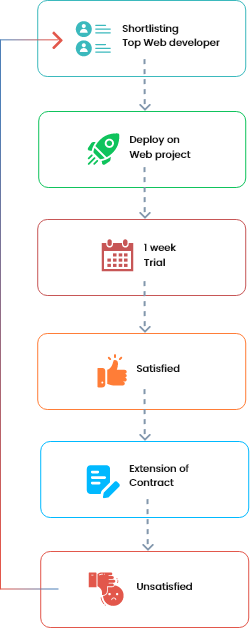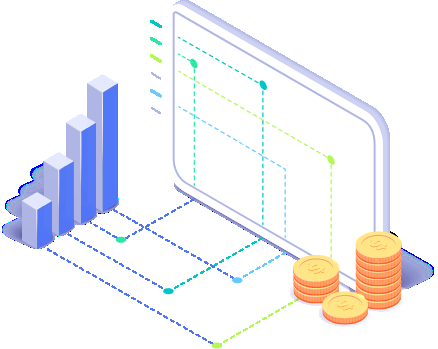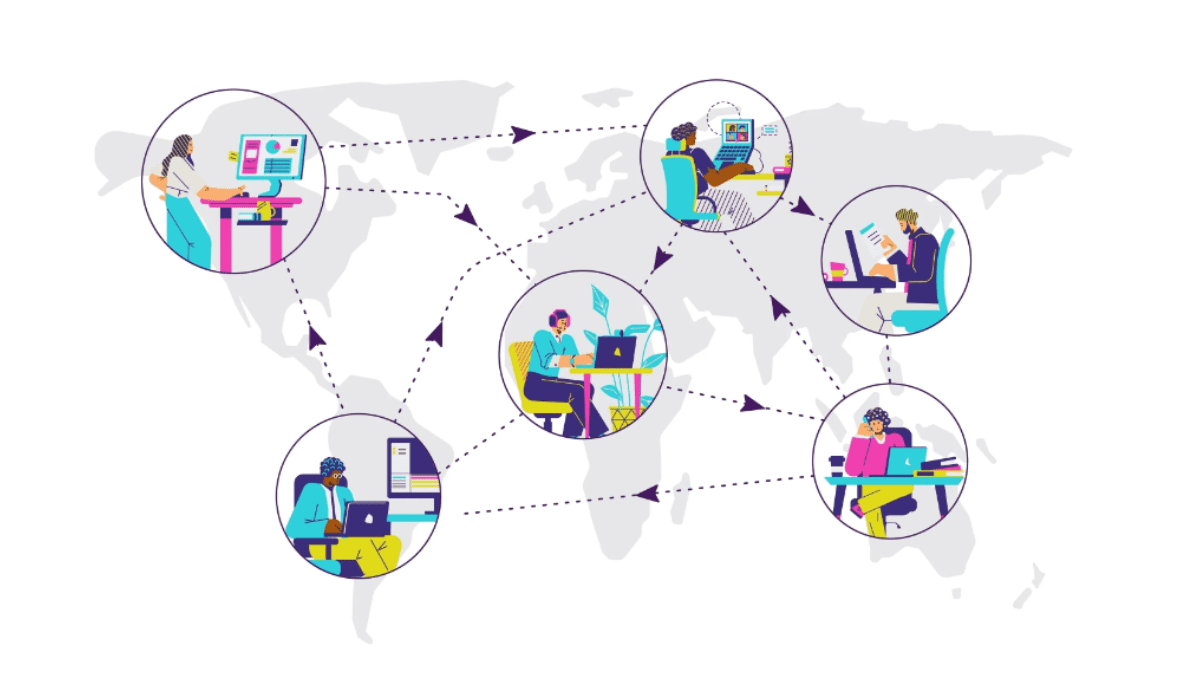Hire Remote Developers
Transform your Development Team With Top 1% Remote Developers
Experience a game-changing transformation in your development team by harnessing the power of remote talent. With seamless collaboration and our versatile team of remote programmers, you'll witness increased productivity and cost-effective solutions.
- Top Rated Talent
- IP Protection & Strict NDA
- Quick & Easy Onboarding Process
- Direct Access to Developer as Your Own Employee
- Flexible Hiring Models - Part-time, Hourly, and Monthly Basis

Our Remote Developers' Expertise
Work with top-rated remote developers with extensive skills and experience. Hire remote developers who are highly proficient in various programming languages, frameworks, and technologies, with a proven track record of delivering outstanding software solutions.
Development Services Our Remote Experts Can Provide
Looking to grow your business operations quickly? YTII has got you covered!We offer dedicated remote developers for all your needs, from web development to enterprise solutions. When you work with our team of remote programmers, you can rest assured that your projects will be handled with the utmost efficiency and skill. Be sure to hire a dedicated remote developer from YTII today!
Custom Software Development
Consulting & POC Development
MVP Development
Technology Upgrade
Web App Development
Mobile App Development
Enterprise App Development
PWA Development
Cloud Migration
DevOps
RPA Solutions
Maintenance & Support
Don't know which remote developers to hire?
Finding the right remote developers can be challenging. Don't waste time and resources on trial and error. Trust our expertise in matching you with the perfect remote developers who possess the skills and experience you require.
Why Hire Remote Developers from YTII
Bug-free Coding
We provide top developers for hire to build error-free, high-performing software solutions to power your business growth.
Agile Development
Our top remote developers follow agile development methodology to ensure your product stays relevant to the changing market demands.
Seamless Communication
We offer top-rated remote developers with high English proficiency to ensure smooth and hassle-free communication.
Pre-vetted Resources
Hire vetted remote developers with extensive industry experience to save on recruitment and training costs
Talent Across Technologies
With a talent pool of 200+ programmers, we help you hire skilled remote developers across the tech stack.
Unique Solutions
Work with top remote developers to build outstanding software solutions using the latest technologies.
On-demand Scaling
You can easily hire skilled remote developers from a readily available talent pool of programmers to scale your operations and meet your project requirements.
Quickest Time-to-market
Our remote app developers help you quickly create web and mobile solutions to gain the first mover’s advantage.
Data Security
When you hire remote engineers from us, you get great talent, a highly secure IT infrastructure, and a work environment that ensures your IPs and Data are always protected.
Enjoy A Hassle-free Process of Hiring Remote Developers
In just four simple steps, we help you hire remote software developers that are the right fit for your project.
-
1 Send Us your requirements.
Fill out the inquiry form with details on your project and developer requirements in different technology stacks.
-
2 We find you the best match.
After carefully analyzing your project need, we shortlist remote experts who best fit your requirements. Their profiles are shared with you for further evaluation and shortlisting.
-
3 We align one-on-one interviews.
Once we get confirmation on your shortlisted candidates, we will align a one-on-one virtual interview for each candidate for final selection.
-
4 Final selection & onboarding.
Once you select the final team of remote developers, we start the onboarding process.
How Does Our 1-Week Trial Work?
We provide you with a week of zero obligation trial of programmers to ensure you get the right resources for your project. If you like our services, we will continue our engagement.


How YTII has helped businesses successfully hire remote developers
Whether you wish to hire remote developers for startups or an enterprise, we offer a full range of services, including web development, product programming, MVP development, and remote software engineers in cutting-edge technologies to help you design, develop and maintain your software solutions.

GoHire
Leading Application Tracking System (ATS) in Europe
Project Scope- GoHire wanted to build a robust hiring solution for SMEs globally that allowed them to hire the right candidates for their organization easily and quickly.
Solution Delivered- After a detailed discussion with clients regarding the project requirements, YTII recommended the Product Engineering Model of the Offshore Development Center
Read Full Story

Dorey Finance
Actuarial Technology (AcTech) company in Guernsey
Project Scope – The client wanted to upgrade its financial tool to improve user experience, reduce operational costs, and address performance issues caused by outdated technology.
Solution Delivered – We helped them deploy a senior developer within two weeks, upgraded tech stack, and optimized performance and overall operational efficiency.
Read Full Story

Finding You
Robust Dating App in Luxembourg
Project Scope – Finding You wanted to create a dating app combining astrology and psychometric analysis and build a budget-friendly, user-friendly matching engine.
Solution Delivered – The app was built with advanced astrological charting and filtering features, while marketing efforts helped expand the user base globally.
Read Full Story

Gettrx
Leading Payment Gateway in US
Project Scope – Gettrx sought a dependable team of experienced IT resources that took care of end-to-end development and management of the solution while ensuring code standards were being met at all time.
Solution Delivered – Your Team" in India deployed highly skilled software engineers with 6+ years of experience in handling complex product development in an agile work model
Read Full Story

Plena Data
Financial Process Automation (USA)
Project Scope – The client sought an offshore software development company that could provide them with the right talent to build premium-quality bots in a quick turnaround time while ensuring complete IP protection.
Solution Delivered – With a team of highly skilled professionals working on developing RPA solutions, the client was able to deliver high-quality bots to their customers quickly and efficiently.
Read Full Story
Flexible Engagement Models to Hire Remote Developers
Do you seek full-time resources or want remote developers for quick business assistance? Get maximum value for your money with our flexible engagement models to hire remote software developers.
Monthly Based
Hire offshore staff for up to 160 hours a month
Manage team using your own methodologies
Get real-time updates on project development
Monthly billing cycles
Hourly Based
Pay for the work done in hours
Add or revoke hours based on requirements
Communicate via your own preferred channels
Real-time updates via timesheet
Fixed-Cost Projects
Fix the project cost before hiring remote developers
Hire developers on a long-term basis
Extend your existing team & reduce time to market
Flexibility to change scope at nominal charges
Facing difficulty deciding on which Hiring Model works best for your project?
Let us help you figure out the answer 
Ultimate Guide to hire remote developers for your business
A remote developer is a software programmer who works outside a traditional office setting. They work from a location of their choice and use their own equipment and communication tools to collaborate with their team. To communicate effectively, remote developers often use video conferencing, instant messaging, and project management tools. They can work from home, in co-working spaces, or in any location that allows them to maintain a productive environment while delivering their work remotely.
Types of Remote Developers:
There are various types of remote developers specializing in different areas:
- Front-end Developers:
These developers can help you in creating user interfaces using HTML, CSS, and JavaScript.
- Back-end Developers:
They are proficient in server-side programming and handling databases.
- Full Stack Developers:
They are equipped with both front-end and back-end development skills.
- Mobile App Developers:
They are experts in building mobile applications for iOS and Android platforms.
- Enterprise Developers:
They help in developing artificial intelligence and machine learning algorithms. These developers also assist in designing and implementing cloud infrastructure for efficient data storage and scalability.
In recent years, it has become clear that working with remote developers is a more efficient and effective way to scale operations. Remote developers bring quality, speed, and innovation to your project. Here are the two advantages of hiring remote developers:
- 1. Access to a global talent pool:
Hiring remote developers allows you to access a global pool of talented professionals with diverse skills and expertise. It empowers you to find remote developers in technologies not prominent in your geography, helping you mitigate challenges like tech talent crunch and long hiring cycles.
- 2. Cost savings:
By hiring remote developers from developing countries such as India, Mexico, and Argentina, you can find talented software engineers at more affordable rates. Additionally, since these developers use their equipment and work remotely, you can save costs on office space, IT infrastructure, and other related expenses.
- 3. Flexibility and scalability:
Hiring remote software developers allow you to easily adjust the size of your team by scaling up or down to meet project requirements. It provides you with the flexibility to adapt to changing customer needs efficiently.
- 4. Increased productivity:
Creating remote teams allows you to hire the best remote dedicated software developers for your project. Your remote teams work across different time zones, enabling round-the-clock project development. Hiring remote developers empowers you to reduce the product's time-to-market manifold.
- 5. Faster recruitment:
Offshore destinations like India offer a large pool of talented remote developers for hire across technologies. You can easily find remote developers matching your project requirements, saving time and effort spent on hiring in-house teams.
- 6. Agile and resilient business models:
Hiring remote developers helps bring diversity to your team. Remote developers from different regions and backgrounds bring unique perspectives and problem-solving approaches. This fosters creativity and innovation and empowers you to build resilient and future-ready solutions.
It's essential to hire the right remote developer to benefit your business. Here are seven steps you should follow when hiring remote programmers.
- Define the scope of work:
To hire developers effectively, you must first define the scope. Craft a clear and concise job posting that outlines the required skills, experience, and qualifications for the role. Provide information about your company and be upfront about the project scope, tech stack, and the number of remote employees needed. By being clear, you'll attract the right remote developers for the job.
- Create a job description:
Once you have clarity on your project requirements, create a detailed job description to attract the right remote developers.
Here are some tips for creating compelling job descriptions to hire remote programmers.
- The job description must be easy to understand. Outlining the job responsibilities and company's culture to attract suitable candidates.
- Use relevant keywords in your job posting to attract qualified developers and increase visibility. Consider what potential applicants are searching for and include those terms in your description.
- To attract quality remote developers, offer a competitive salary based on industry and market rates.
- Choose the right platforms to hire remote software developers:
Once you have the description ready, post it on various remote job portals and networking sites like LinkedIn to make it visible to the applicants. Select reliable platforms to find remote developers. Ask for recommendations from your employees or contacts to find the right remote developer for your project.
- Review the applicants:
Once you receive the resumes, shortlist remote developers for the next round by reviewing criteria like educational background, experience, technology expertise, etc. Conduct virtual interviews with shortlisted remote developers. Designated company members, like team leaders or senior software engineers, who can conduct the technical interviews.
- Test the technical skills:
A technical test is necessary to hire skilled remote developers. It helps you assess a remote developer's programming language proficiencies and coding capabilities. You can do this by either sending them an assignment to complete. Or conduct a live test where you share a scenario and ask the developers to write code.
In addition, review their past work to determine if they possess the necessary skills and experience for a project similar to yours.
- Assess soft skills:
When hiring remote developers, look for soft skills like communication, teamwork, problem-solving, time management, and decision-making. Ensure remote developers understand your project's requirements and how they align with business goals.
- Select and onboard the remote software developers:
Assessment of technical and soft skills will give a fair idea of the top remote developers for hire in the shortlisted candidates. Now it's time to hire the best remote dedicated software developers that fit your project requirements.
Ensure remote software developers receive adequate onboarding and training to access all necessary tools and information for successful project completion.
Effective communication, trust, and transparency are key to successful relationships with remote developers.
The hourly rate of hiring remote software developers in India can range between $18 to $35, depending on their skillsets, tech expertise, industry experience, and location. Here is a cost comparison of Indian remote developers based on their expertise.
| Average Hourly Rate | India |
|---|---|
| Software Programmer | $18- $25 |
| Mobile App Developer | $18- $39 |
| Web Developer | $16- $30 |
| RPA Developer | $20- $40 |
| Cloud Computing & Tech Migration | $18- $35 |
Here are the top eight challenges of working with remote developers and their solutions.
- 1. Finding remote developers for hire:
When seeking remote developers from around the world, it can take time to find the ones who possess the skills, experience, and cultural fit you need. This task requires thorough screening and evaluation procedures.
- 2. Communication and collaboration:
Communication and collaboration can become challenging when the remote software development teams operate across various time zones, come from different cultural backgrounds, and speak different languages. Setting up proper communication tools and finding remote developers proficient in speaking English is necessary for successful collaboration.
- 3. Legalities:
Every country has its own employment and labor laws. Navigating the legalities while hiring remote developers from different countries can become tiresome without a reliable partner.
- 4. Security and data protection:
Working with remote software developers means providing access to your data and IPs. This can leave your data vulnerable. So, implementing robust data protection measures and security protocols is crucial to maintaining the confidentiality of information.
- 5. Technical difficulties:
Remote work heavily depends on technology, which means technical problems such as internet outages, software glitches, or hardware malfunctions can negatively impact productivity and communication. It is crucial to have sufficient technical support and contingency plans in place.
- 6. Onboarding and integration:
Incorporating remote software programmers into an established team and effectively onboarding them can become challenging. Providing them with the necessary resources, information, and support is crucial to start on the right foot.
- 7. Maintaining team cohesion:
Creating a strong team culture and promoting inclusion for remote developers can be more difficult than in-person teams. Employers should implement techniques that encourage team bonding and engagement.
- 8. Monitoring productivity and performance:
Managing remote developers' productivity and performance can be trickier than in-person employees. To address this challenge, employers must establish clear performance metrics and use appropriate project management tools to track progress effectively.
When hiring remote teams, instead of hiring top remote developers, find remote software programmers who fit your business requirements better.
- 1. Not Respecting Time Zone Differences:
When hiring remote developers, it is crucial to consider the differences in time zones. You don't want your developers to work in the middle of the night or miss meetings because of conflicting schedules. Establishing a team calendar and ensuring everyone is informed about the various time zones when scheduling events or meetings is advisable.
- 2. Failing To Create a Clear Communication Plan
Effective communication is vital when working with remote software developers. So having a robust communication plan that accounts for the right tools, channels, and team meetings is crucial to the success of your project.
To ensure that work is delivered on time, every member should have clarity on their KPIs, project progress, and goals.
- 3. Not Using Proper Tools for Tracking Progress:
Before hiring a remote software developer team, ensure you have the right project management tools to monitor work. These tools are crucial for ensuring accountability and progress tracking. They allow you to assign tasks easily, set deadlines, and monitor progress. Utilizing them lets you easily check in on your remote team and ensure all tasks are completed on time.
- 4. Lack of proper onboarding process:
When hiring remote software developers, it is crucial to ensure they possess the necessary knowledge about the project to perform their job duties effectively. This can only be achieved by providing proper training and project downloads to the hired team of remote programmers. Providing your remote team with equal access to resources like tutorials, videos, online courses, or one-on-one training sessions is necessary.
- 5. Considering Cost as Only Hiring Factor
Though cost is an important factor, it should not be the only criterion for hiring remote developers. A low-cost resource could also result in low-quality work. To avoid this, you must carefully evaluate the candidates' skill sets and work portfolios to find top remote developers.
- 6. Slow Hiring Process
It is important to understand, like you, many other organizations want to hire the best remote dedicated software developers. So, a long hiring process can cause you to lose quality resources to competition.
Today, companies worldwide are hiring remote developers for quick business assistance. There are still misconceptions about their work quality and productivity.
Let us explore the most common misconceptions:
- Myth 1- Remote Teams Will Affect Work Productivity
One of the common misconceptions when hiring remote developers is that productivity may decrease because of the time zone differences between the remote and in-house teams. A remote team can be advantageous as they can work around the clock to keep the project going. Once the in-house team completes their workday, the remote team can take over and ensure a seamless workflow.
- Myth 2- Difference In Culture Will Create Friction Among Teams:
Companies fear hiring remote developers will create friction due to their backgrounds and cultural differences. It can affect efficiencies and result in low-quality software development.
But, in reality, having a diverse team creates a more resilient work culture. When you have experts from different parts of the world working on a product, they bring their expertise and market knowledge to the table. This helps in building products that are global and future-ready.
- Myth 3- Our Data Will Be Compromised:
Businesses worry that hiring remote software developers means putting your data and IPs at risk of infringement. The data will be accessed on different servers and systems, compromising its security.
But the fact is, when you hire remote software developers from a reliable offshoring partner, you get safe IT infrastructure with enterprise-grade security.
Offshore companies follow strict security protocols to ensure your data is never compromised. Besides, your remote teams willingly sign NDAs to protect your IPs.
- Myth 4- Communication Will Be a Hassle:
Another common myth when working with a remote team is that communication will become a hassle due to language barriers. Though this concern may not be completely invalid, choosing the right destination to hire remote programmers is the key to successful remote operations. When you hire remote developers from India, an English-speaking country with extensive experience in outsourcing IT services, you don’t face challenges communicating with programmers.
Also, setting up proper communication channels and tools can deliver seamless and hassle-free collaboration with remote teams.
- Myth 5- You Cannot Efficiently Monitor Remote Teams' Work:
Businesses fear monitoring work, and assessing the productivity of a remote team is difficult since they don’t have real-time visibility of operations. But, having the right management and productivity tools can make managing remote teams a cakewalk. You must also communicate the work expectations regarding KPIs, project goals, and timelines to the remote developers.
Here are some must-ask questions before hiring remote developers.
- Do you have experience working in a remote setup?
- How do you organize your time and manage your day while working remotely?
- How do you handle communication and collaboration with other team members
- State an example of a challenge you have faced while working remotely. How did you address it?
- What is your system and work setup?
- How do you upgrade your skills to stay relevant with changing technology trends?
- Do you manage time-zone differences while working with other team members?
- What security measures do you take to ensure data privacy?
- How do you handle disagreements with team members?
Askin these questions will help you gauge if the developer is the right fit for your project.
- Establish clear and open lines of communication. Utilize video conferencing, chat platforms, and project management tools to stay connected and promote collaboration.
- Clear communication of project goals, timelines, and expectations is crucial for success. Every team member must understand their role and responsibility to ensure efficiency and accountability.
- Regular check-ins with team members are essential to discuss progress, address challenges, and provide feedback. It can be done individually or as a team based on project needs.
- Encourage teamwork with collaboration tools for virtual brainstorming, code reviews, and pair programming.
- Trust your remote team and give them space to work independently. Focus on results, not micromanaging every step.
- Use project management tools like Jira, Trello, and Asana to promote team accountability and efficiency by tracking tasks and progress.
- Set clear Documentation processes, guidelines, and best practices to ensure consistency and clarity to encourage efficient knowledge transfer.
- Organize virtual events to build relationships and improve team dynamics. This creates a sense of community and camaraderie among team members.
- Provide training opportunities to help team members improve skills and stay current with technology.
- Recognize and appreciate your remote team's accomplishments, acknowledge their efforts, and provide constructive feedback to motivate them.
- When managing a remote team in different time zones, prioritize scheduling to ensure real-time collaboration and meeting deadlines.
- Use productivity tracking or project management tools to monitor progress and identify obstacles, but focus on outcomes rather than micromanaging every task.
A remote developer is a software programmer who works outside a traditional office setting. They work from a location of their choice and use their own equipment and communication tools to collaborate with their team. To communicate effectively, remote developers often use video conferencing, instant messaging, and project management tools. They can work from home, in co-working spaces, or in any location that allows them to maintain a productive environment while delivering their work remotely.
Types of Remote Developers:
There are various types of remote developers specializing in different areas:
- Front-end Developers:
These developers can help you in creating user interfaces using HTML, CSS, and JavaScript.
- Back-end Developers:
They are proficient in server-side programming and handling databases.
- Full Stack Developers:
They are equipped with both front-end and back-end development skills.
- Mobile App Developers:
They are experts in building mobile applications for iOS and Android platforms.
- Enterprise Developers:
They help in developing artificial intelligence and machine learning algorithms. These developers also assist in designing and implementing cloud infrastructure for efficient data storage and scalability.
In recent years, it has become clear that working with remote developers is a more efficient and effective way to scale operations. Remote developers bring quality, speed, and innovation to your project. Here are the two advantages of hiring remote developers:
- 1. Access to a global talent pool:
Hiring remote developers allows you to access a global pool of talented professionals with diverse skills and expertise. It empowers you to find remote developers in technologies not prominent in your geography, helping you mitigate challenges like tech talent crunch and long hiring cycles.
- 2. Cost savings:
By hiring remote developers from developing countries such as India, Mexico, and Argentina, you can find talented software engineers at more affordable rates. Additionally, since these developers use their equipment and work remotely, you can save costs on office space, IT infrastructure, and other related expenses.
- 3. Flexibility and scalability:
Hiring remote software developers allow you to easily adjust the size of your team by scaling up or down to meet project requirements. It provides you with the flexibility to adapt to changing customer needs efficiently.
- 4. Increased productivity:
Creating remote teams allows you to hire the best remote dedicated software developers for your project. Your remote teams work across different time zones, enabling round-the-clock project development. Hiring remote developers empowers you to reduce the product's time-to-market manifold.
- 5. Faster recruitment:
Offshore destinations like India offer a large pool of talented remote developers for hire across technologies. You can easily find remote developers matching your project requirements, saving time and effort spent on hiring in-house teams.
- 6. Agile and resilient business models:
Hiring remote developers helps bring diversity to your team. Remote developers from different regions and backgrounds bring unique perspectives and problem-solving approaches. This fosters creativity and innovation and empowers you to build resilient and future-ready solutions.
It's essential to hire the right remote developer to benefit your business. Here are seven steps you should follow when hiring remote programmers.
- Define the scope of work:
To hire developers effectively, you must first define the scope. Craft a clear and concise job posting that outlines the required skills, experience, and qualifications for the role. Provide information about your company and be upfront about the project scope, tech stack, and the number of remote employees needed. By being clear, you'll attract the right remote developers for the job.
- Create a job description:
Once you have clarity on your project requirements, create a detailed job description to attract the right remote developers.
Here are some tips for creating compelling job descriptions to hire remote programmers.
- The job description must be easy to understand. Outlining the job responsibilities and company's culture to attract suitable candidates.
- Use relevant keywords in your job posting to attract qualified developers and increase visibility. Consider what potential applicants are searching for and include those terms in your description.
- To attract quality remote developers, offer a competitive salary based on industry and market rates.
- Choose the right platforms to hire remote software developers:
Once you have the description ready, post it on various remote job portals and networking sites like LinkedIn to make it visible to the applicants. Select reliable platforms to find remote developers. Ask for recommendations from your employees or contacts to find the right remote developer for your project.
- Review the applicants:
Once you receive the resumes, shortlist remote developers for the next round by reviewing criteria like educational background, experience, technology expertise, etc. Conduct virtual interviews with shortlisted remote developers. Designated company members, like team leaders or senior software engineers, who can conduct the technical interviews.
- Test the technical skills:
A technical test is necessary to hire skilled remote developers. It helps you assess a remote developer's programming language proficiencies and coding capabilities. You can do this by either sending them an assignment to complete. Or conduct a live test where you share a scenario and ask the developers to write code.
In addition, review their past work to determine if they possess the necessary skills and experience for a project similar to yours.
- Assess soft skills:
When hiring remote developers, look for soft skills like communication, teamwork, problem-solving, time management, and decision-making. Ensure remote developers understand your project's requirements and how they align with business goals.
- Select and onboard the remote software developers:
Assessment of technical and soft skills will give a fair idea of the top remote developers for hire in the shortlisted candidates. Now it's time to hire the best remote dedicated software developers that fit your project requirements.
Ensure remote software developers receive adequate onboarding and training to access all necessary tools and information for successful project completion.
Effective communication, trust, and transparency are key to successful relationships with remote developers.
The hourly rate of hiring remote software developers in India can range between $18 to $35, depending on their skillsets, tech expertise, industry experience, and location. Here is a cost comparison of Indian remote developers based on their expertise.
| Average Hourly Rate | India |
|---|---|
| Software Programmer | $18- $25 |
| Mobile App Developer | $18- $39 |
| Web Developer | $16- $30 |
| RPA Developer | $20- $40 |
| Cloud Computing & Tech Migration | $18- $35 |
Here are the top eight challenges of working with remote developers and their solutions.
- 1. Finding remote developers for hire:
When seeking remote developers from around the world, it can take time to find the ones who possess the skills, experience, and cultural fit you need. This task requires thorough screening and evaluation procedures.
- 2. Communication and collaboration:
Communication and collaboration can become challenging when the remote software development teams operate across various time zones, come from different cultural backgrounds, and speak different languages. Setting up proper communication tools and finding remote developers proficient in speaking English is necessary for successful collaboration.
- 3. Legalities:
Every country has its own employment and labor laws. Navigating the legalities while hiring remote developers from different countries can become tiresome without a reliable partner.
- 4. Security and data protection:
Working with remote software developers means providing access to your data and IPs. This can leave your data vulnerable. So, implementing robust data protection measures and security protocols is crucial to maintaining the confidentiality of information.
- 5. Technical difficulties:
Remote work heavily depends on technology, which means technical problems such as internet outages, software glitches, or hardware malfunctions can negatively impact productivity and communication. It is crucial to have sufficient technical support and contingency plans in place.
- 6. Onboarding and integration:
Incorporating remote software programmers into an established team and effectively onboarding them can become challenging. Providing them with the necessary resources, information, and support is crucial to start on the right foot.
- 7. Maintaining team cohesion:
Creating a strong team culture and promoting inclusion for remote developers can be more difficult than in-person teams. Employers should implement techniques that encourage team bonding and engagement.
- 8. Monitoring productivity and performance:
Managing remote developers' productivity and performance can be trickier than in-person employees. To address this challenge, employers must establish clear performance metrics and use appropriate project management tools to track progress effectively.
When hiring remote teams, instead of hiring top remote developers, find remote software programmers who fit your business requirements better.
- 1. Not Respecting Time Zone Differences:
When hiring remote developers, it is crucial to consider the differences in time zones. You don't want your developers to work in the middle of the night or miss meetings because of conflicting schedules. Establishing a team calendar and ensuring everyone is informed about the various time zones when scheduling events or meetings is advisable.
- 2. Failing To Create a Clear Communication Plan
Effective communication is vital when working with remote software developers. So having a robust communication plan that accounts for the right tools, channels, and team meetings is crucial to the success of your project.
To ensure that work is delivered on time, every member should have clarity on their KPIs, project progress, and goals.
- 3. Not Using Proper Tools for Tracking Progress:
Before hiring a remote software developer team, ensure you have the right project management tools to monitor work. These tools are crucial for ensuring accountability and progress tracking. They allow you to assign tasks easily, set deadlines, and monitor progress. Utilizing them lets you easily check in on your remote team and ensure all tasks are completed on time.
- 4. Lack of proper onboarding process:
When hiring remote software developers, it is crucial to ensure they possess the necessary knowledge about the project to perform their job duties effectively. This can only be achieved by providing proper training and project downloads to the hired team of remote programmers. Providing your remote team with equal access to resources like tutorials, videos, online courses, or one-on-one training sessions is necessary.
- 5. Considering Cost as Only Hiring Factor
Though cost is an important factor, it should not be the only criterion for hiring remote developers. A low-cost resource could also result in low-quality work. To avoid this, you must carefully evaluate the candidates' skill sets and work portfolios to find top remote developers.
- 6. Slow Hiring Process
It is important to understand, like you, many other organizations want to hire the best remote dedicated software developers. So, a long hiring process can cause you to lose quality resources to competition.
Today, companies worldwide are hiring remote developers for quick business assistance. There are still misconceptions about their work quality and productivity.
Let us explore the most common misconceptions:
- Myth 1- Remote Teams Will Affect Work Productivity
One of the common misconceptions when hiring remote developers is that productivity may decrease because of the time zone differences between the remote and in-house teams. A remote team can be advantageous as they can work around the clock to keep the project going. Once the in-house team completes their workday, the remote team can take over and ensure a seamless workflow.
- Myth 2- Difference In Culture Will Create Friction Among Teams:
Companies fear hiring remote developers will create friction due to their backgrounds and cultural differences. It can affect efficiencies and result in low-quality software development.
But, in reality, having a diverse team creates a more resilient work culture. When you have experts from different parts of the world working on a product, they bring their expertise and market knowledge to the table. This helps in building products that are global and future-ready.
- Myth 3- Our Data Will Be Compromised:
Businesses worry that hiring remote software developers means putting your data and IPs at risk of infringement. The data will be accessed on different servers and systems, compromising its security.
But the fact is, when you hire remote software developers from a reliable offshoring partner, you get safe IT infrastructure with enterprise-grade security.
Offshore companies follow strict security protocols to ensure your data is never compromised. Besides, your remote teams willingly sign NDAs to protect your IPs.
- Myth 4- Communication Will Be a Hassle:
Another common myth when working with a remote team is that communication will become a hassle due to language barriers. Though this concern may not be completely invalid, choosing the right destination to hire remote programmers is the key to successful remote operations. When you hire remote developers from India, an English-speaking country with extensive experience in outsourcing IT services, you don’t face challenges communicating with programmers.
Also, setting up proper communication channels and tools can deliver seamless and hassle-free collaboration with remote teams.
- Myth 5- You Cannot Efficiently Monitor Remote Teams' Work:
Businesses fear monitoring work, and assessing the productivity of a remote team is difficult since they don’t have real-time visibility of operations. But, having the right management and productivity tools can make managing remote teams a cakewalk. You must also communicate the work expectations regarding KPIs, project goals, and timelines to the remote developers.
Here are some must-ask questions before hiring remote developers.
- Do you have experience working in a remote setup?
- How do you organize your time and manage your day while working remotely?
- How do you handle communication and collaboration with other team members
- State an example of a challenge you have faced while working remotely. How did you address it?
- What is your system and work setup?
- How do you upgrade your skills to stay relevant with changing technology trends?
- Do you manage time-zone differences while working with other team members?
- What security measures do you take to ensure data privacy?
- How do you handle disagreements with team members?
Askin these questions will help you gauge if the developer is the right fit for your project.
- Establish clear and open lines of communication. Utilize video conferencing, chat platforms, and project management tools to stay connected and promote collaboration.
- Clear communication of project goals, timelines, and expectations is crucial for success. Every team member must understand their role and responsibility to ensure efficiency and accountability.
- Regular check-ins with team members are essential to discuss progress, address challenges, and provide feedback. It can be done individually or as a team based on project needs.
- Encourage teamwork with collaboration tools for virtual brainstorming, code reviews, and pair programming.
- Trust your remote team and give them space to work independently. Focus on results, not micromanaging every step.
- Use project management tools like Jira, Trello, and Asana to promote team accountability and efficiency by tracking tasks and progress.
- Set clear Documentation processes, guidelines, and best practices to ensure consistency and clarity to encourage efficient knowledge transfer.
- Organize virtual events to build relationships and improve team dynamics. This creates a sense of community and camaraderie among team members.
- Provide training opportunities to help team members improve skills and stay current with technology.
- Recognize and appreciate your remote team's accomplishments, acknowledge their efforts, and provide constructive feedback to motivate them.
- When managing a remote team in different time zones, prioritize scheduling to ensure real-time collaboration and meeting deadlines.
- Use productivity tracking or project management tools to monitor progress and identify obstacles, but focus on outcomes rather than micromanaging every task.
Frequently Asked Questions
Hiring remote developers helps counter the tech-talent crunch and offers many benefits for businesses. It provides access to a global talent pool, helps save costs, increases productivity, and enables quick scalability.
Hiring a remote developer can cost anywhere from $4,000 to $10,000 on average, with hourly rates ranging from $18 to $40. The cost of hiring remote developers depends on their location, industry experience, tech expertise, and skillsets.
Hiring remote developers has many benefits, including access to a global talent pool, cost-effectiveness, increased productivity, diverse perspectives, scalability, and improved focus on core functions of the business.
The cons of hiring remote developers are communication and collaboration challenges, performance management challenges, and misalignment between internal and remote teams.
However, one can address these challenges by setting up proper tools and systems and fostering a work environment that celebrates diversity.
If you are dissatisfied with the performance of your hired remote developers, we will help you find a replacement for the resource within a week.
It can take around 2-5 weeks to hire remote developers from YTII.
By thoroughly evaluating the developer’s soft skills, people skills, work ethics, and methodology during the interview, you can assess whether a remote developer is a good cultural fit for your team.
Yes. We have a resource replacement policy to help clients find new hires if they are dissatisfied within a week.
Our Blog
Read on the topics that matter most to you through our comprehensive research articles & informative blogs.

How to Find Remote Developers in 2024: Step By Step Guide

Benefits of Hiring Remote Developers for a Business


















